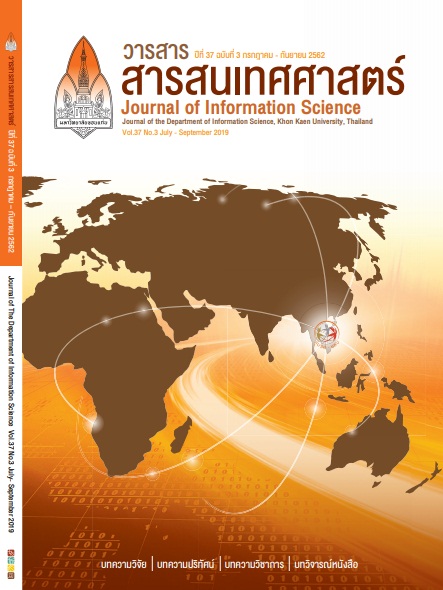Status of Health Literacy in Pregnant Women and Child at Four Years Postpartum
DOI:
https://doi.org/10.14456/jiskku.2020.8Keywords:
Health Literacy, Mother and ChildAbstract
Purpose of the study: To study the status of health literacy in pregnant women and child at four years postpartum.
Methodology: Survey methodology were conducted by used the online questionnaire with an ethnically representative sample of the status of health literacy in pregnant women during May-June in 2019 and/or child at four years postpartum with June 2019.
Main Findings: The main themes identified in the representative sample revealed that all of six skills of the status of health literacy in pregnant women is in good criteria.
Applications of this study: Service group such as in hospital, relevant people for example he is work as doctor, nurse, medical staffs medical identified get these results to promote and adjust which relate to pregnant women and children. Additionally, the specific group who works as doctor, nurse, medical staffs, researchers, lectures. There were able to adjust of knowledge contents and /or recommendation related to variously and increase properly into social conditions and technology more and more.
Downloads
References
Bloom, BS. (1971). Handbook on formation and Summative Evaluation of Student Learning. New York: mcgraw-Hill Book Company.
Bureau of Reproductive Health Department of Health1. (2017). Action plan under policy and strategy Development of health National Varieties, 2nd edition (2017 - 2026) on the promotion of quality birth and growth 2017 - 2019. Agricultural Cooperative Assembly of Thailand: Bangkok public health.
Bureau of Reproductive Health Department of Health2. (2017). The 2nd National Reproductive Health Development Policy and Strategy (2017 - 2026). Bureau of Reproductive Health Department of Health.
Bureau of Reproductive Health. (2018). Nayobai Lae Yutthasat Kan Phatthana Anamai Kan Charoenphan Haeng Chat Chabap Thi 2 Phoso 2560-2569. Bangkok: Bureau of Reproductive Health, Ministry of Public Health.
Health Education Division. (2016). Kan soem son somying pharuetikam sukkhaphap Klum dek wai rian klum wai thamngan. Bangkok: New Thammada Press.
Health Education Division. (2018). Kan soemsang lae pramoen khwam ropru dan sukkhaphap lae pharuetikam sukkhaphap klum dek lae yaowachon ayu 7-14 pi lae klum prachachon thi mi ayu 15 pi khuen pai. Bangkok:
Health Education Division, Department of Health Service Support, Ministry of Public Health.
Ministry of Public Health. (2018). Chamnuan lae attra charoenphan to prachakon ying 1000 khon chamnaek tam klum ayu manda pi phoso 2545-2560 rai pi. Retrieved 6 October 2019, from http://social.nesdc.go.th/socialstat/statreport_Final.aspx?Reportid=215&template=1R2C&yeartype=M&subcatid=15
Phuangprayong, K. (2018). Future desire for children: empirical evidences from married women in thailand. Srinakharinwirot Research and Development (Journal of Humanities and Social Sciences), 10(19), 1-19.
Thai Health Promotion Foundation. (2018). Standard of Practice for. Comprehensive Safe Abortion Care. Bangkok: Shermas.
Thaipost. (2018). Phoei luk kin nom mae 6 duean raek tam reng khapkhluean phorobo nomphong. Retrieved 6 October 2019, from https://www.thaipost.net/main/detail/14807
The Planned Parenthood Association of Thailand. (2017). Kan hai borikan lae prueksa dan anamai kan charoenphan. Retrieved 18 October 2019, from http://ppat.or.th/การให้บริการและปรึกษา
Theasianparent Thailand. (2009). Theasianparentthailand. Retrieved 29 August 2019, from https://th.theasianparent.com/about-us








